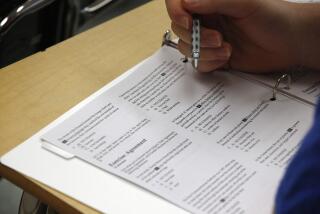UC to ease admission requirements: No SAT, no letter grades due to coronavirus

The University of California announced Wednesday that it will greatly ease some admission requirements for fall 2020 and beyond by eliminating SAT scores and letter grades for required courses, saying that “grave disruption” to schools during the coronavirus crisis calls for maximum flexibility in evaluating students.
The move, authorized by UC Board of Regents leaders, will relax the admissions process for the more than 200,000 prospective freshmen and transfer students who apply each year to the UC system’s nine undergraduate campuses but are now studying under dramatically different — and, for many, highly stressful — circumstances.
The 23-campus California State University also announced temporary changes to admission requirements for applicants, who numbered about 363,000 last fall.
Those students may not meet UC and Cal State admission requirements this year because their high schools or community colleges have shifted to online instruction with varying degrees of success, pass/fail grading systems or reduced course offerings.
In addition, standardized test scores may be difficult to obtain because testing dates are being canceled or postponed for many required tests, including the SAT and ACT, high school exit exams and, for international students, evaluations of English-language proficiency.
“The COVID-19 outbreak is a disaster of historic proportions disrupting every aspect of our lives, including education for high school students, among others,” UC President Janet Napolitano said in a statement. “The University’s flexibility at this crucial time will ensure prospective students aiming for UC get a full and fair shot — no matter their current challenges.”
The UC Academic Senate agreed to temporarily suspend several admission regulations at the request of Han Mi Yoon-Wu, director of undergraduate admissions at the UC Office of the President. “With such grave disruption in the education system, administrators are seeking flexibility where possible under these untenable conditions,” Yoon-Wu wrote in a March 20 letter to Eddie Comeaux, who heads the Academic Senate committee that oversees all undergraduate admission policies and practices.
“We owe it to our students to ensure that we’re supporting them in a process that is fair,” Comeaux said. “We want to ensure temporary flexibility, understanding that all requirements may not be met because of serious family or personal issues, or because a school decided to cancel certain courses or change the grading format.”
The Cal State Academic Senate supports the admissions changes but is cautioning against a blanket reduction of entrance standards in the future. Catherine Nelson, systemwide chair of the Cal State Academic Senate, said faculty are concerned about how the changes might impact students’ preparation for university-level coursework and whether adequate support resources would be in place this fall.
“This is a very unique and challenging time for students, and we want to make sure that if they had planned to be CSU-bound we do everything we can to help them reach that goal,” she said.
The modifications to admission requirements include:
- Both the UC and Cal State systems will suspend the letter grade requirement for the 15 prescribed college-preparatory courses completed in winter/spring/summer 2020 for all students, including the most recently admitted freshmen. Cal State may make admissions exceptions on a case-by-case basis for students who fail to complete all of the required courses because of the pandemic.
- UC will suspend the standardized test requirement for students applying for fall 2021 freshman admission. Cal State is still evaluating its process for fall 2021, as campuses normally use high school GPA and SAT or ACT scores to calculate eligibility for admission, but applicants may have problems providing those metrics.
- Neither system will rescind admission offers that result from students or schools missing official final transcript deadlines. UC will honor admission through the first day of class until official documents are received by campuses. Cal State will accept official transcripts through the fall 2020 term.
- For transfer students, UC will temporarily suspend the cap on the number of transferable units with pass/no pass grading applied toward the minimum 60 semester/90 quarter units required for junior standing. Cal State also will accept “credit” or “pass” for required courses taken in winter/spring/summer 2020 and reduce the number of transfer units needed to enroll.
Yoon-Wu noted that efforts to contain the coronavirus outbreak had caused an “unprecedented and growing number of school closures” that have forced institutions to confront myriad challenges as they have switched abruptly to remote instruction.
The uncertainty is global, she said, noting that students studying overseas might be unable to earn the credentials typically required for UC admission, as prescribed testing has been or is likely to be disrupted in such countries as the United Kingdom, Pakistan, France, Germany and Italy.
“This period of uncertainty predicated by the COVID-19 situation greatly impacts our previously assured pipeline of students to UC, which includes California resident freshmen, California Community college transfers, domestic and international nonresidents,” she wrote. “The academic verification process ... and enrollments will be notably compromised.”
UC Board of Regents Chair John A. Pérez and Maria Anguiano, the Academic and Student Affairs Committee chair, approved the temporary waiver of admissions requirements.
“We want to help alleviate the tremendous disruption and anxiety that is already overwhelming prospective students due to COVID-19,” Pérez said in a statement. “By removing artificial barriers and decreasing stressors — including suspending the use of the SAT — for this unprecedented moment in time, we hope there will be less worry for our future students.”
Napolitano said students can still submit standardized test scores, which can support their statewide UC eligibility and application for scholarships and help fulfill some graduation requirements.
She said campuses would adjust their admissions review processes “to ensure that no student is harmed in admissions selection should they not submit a test score.”
The suspension of standardized testing requirements for applicants was “intended as an accommodation and not a permanent policy shift, and does not foreclose future Board policy actions” regarding the tests, she said. UC officials are currently debating whether to eliminate the SAT and ACT testing requirement, and regents are expected to take action, possibly in May.
Both UC and Cal State will accept the results of high school Advanced Placement exams even though they are being significantly revised to recognize the move to online learning and social distancing practices. The College Board, which owns the exams, has announced they will be given at home as open-book tests this year and last only 45 minutes, which is significantly shorter than the usual two-to-three-hour duration. Students typically earn college credit for the courses if they earn a score of 3 or above out of 5.
The College Board also said Wednesday that it will provide additional SAT testing dates and increased capacity “as soon as the public health situation allows” and, if schools remain closed, would pursue “innovative means” to ensure all students can take the exam this fall.
The UC announcement came as a relief to many students, families, high school counselors and equity advocates. Audrey Dow, senior vice president for the Campaign for College Opportunity, said the coronavirus crisis has exacerbated inequities in education as students struggle with access to computers, the internet, counseling and guidance.
“UC leaders are showing us they can pivot quickly to ensure equity in admissions for our most vulnerable students,” she said.
UC campus admission directors say they plan to fully embrace the call for flexibility.
Lisa Przekop, UC Santa Barbara admissions director, said admitted students are usually required to accept an admission offer by May 1, for instance, and provide official transcripts documenting their self-reported grades by July. Those deadlines are important, she said, so campuses can begin planning housing assignments, orientations and other events.
Napolitano said that those deadlines would remain in place but that students and schools will not face consequences if they are not met, and students will not be required to submit a nonrefundable deposit by May 1 if they are unable to do so. At Cal State, campuses are making individual decisions on whether to extend those deadlines.
Przekop said UC Santa Barbara would use “maximum flexibility” in considering why some students may not make those deadlines or meet other requirements.
“We’re going to need to give students the benefit of the doubt,” she said. “I don’t want them to panic. We’re on their side.”
More to Read
Sign up for Essential California
The most important California stories and recommendations in your inbox every morning.
You may occasionally receive promotional content from the Los Angeles Times.











